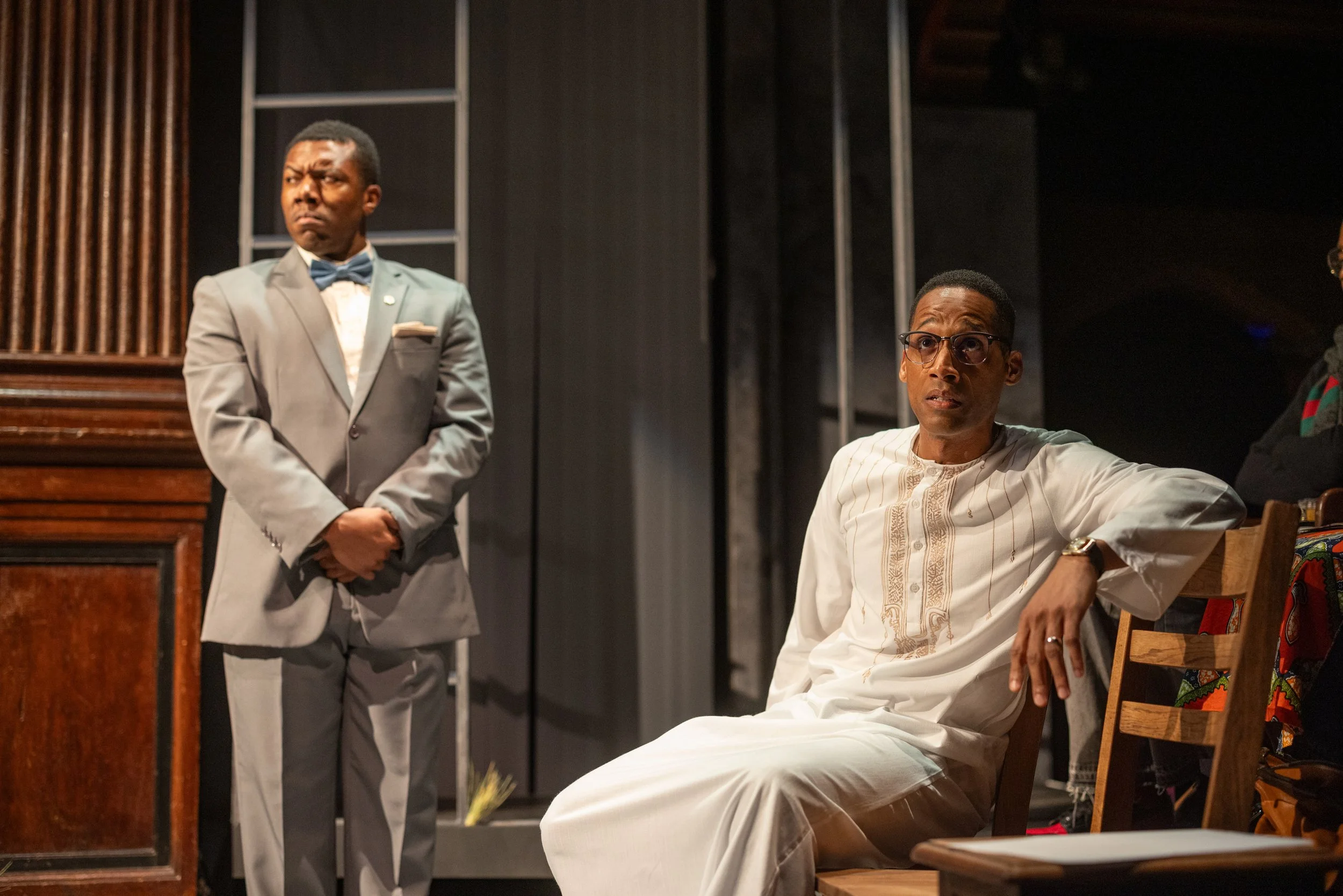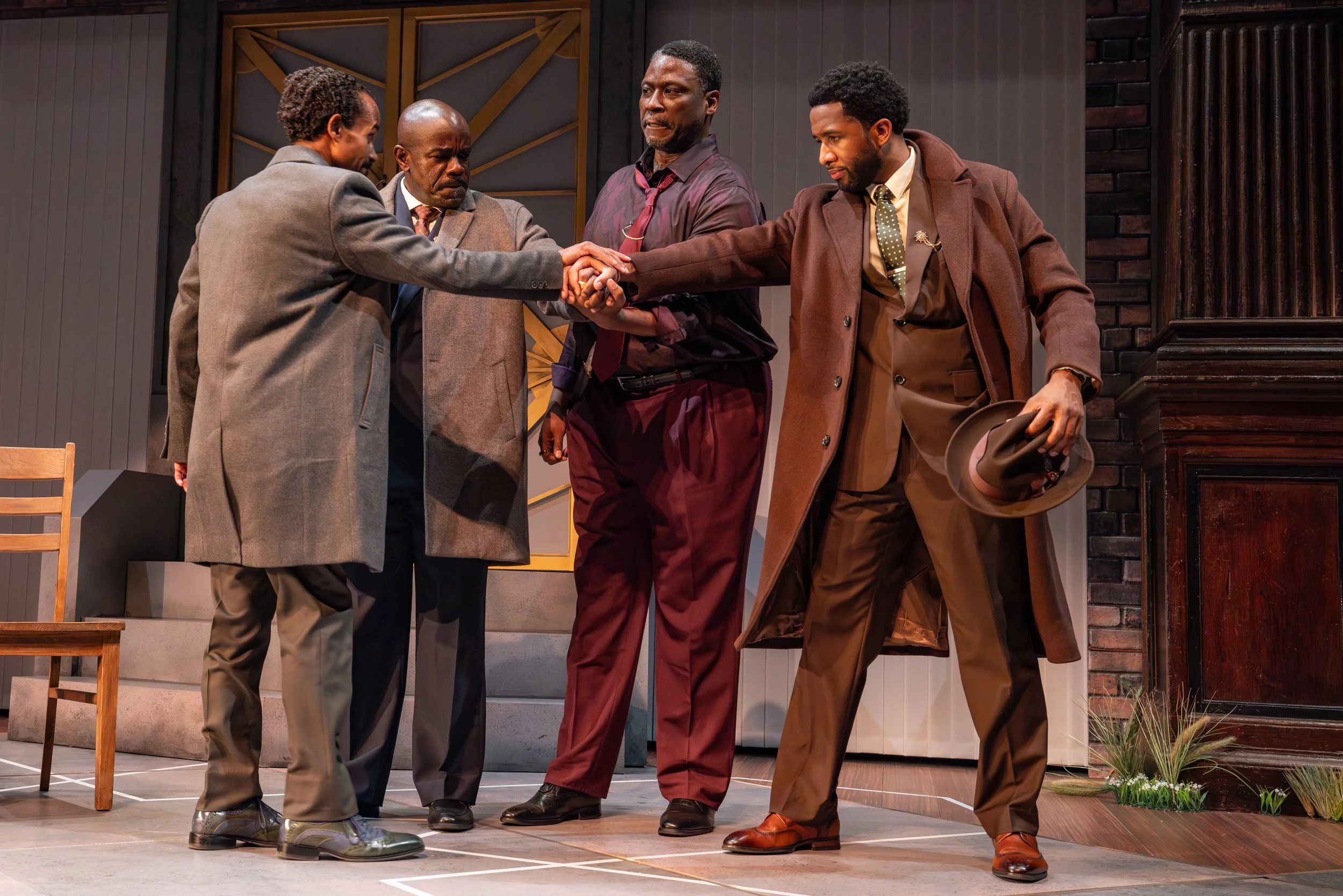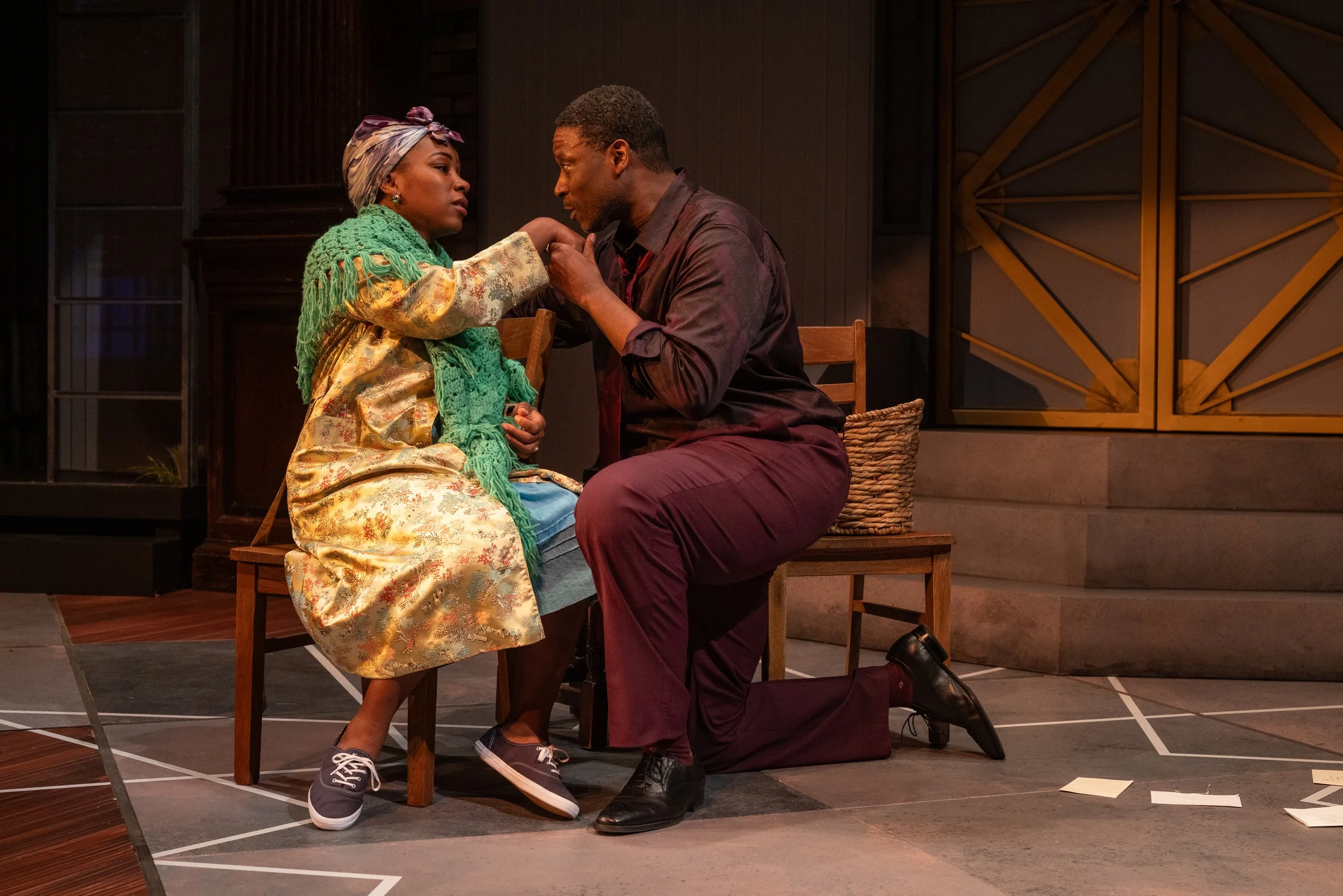A bold experiment at the Folger melds ‘Julius Caesar’ with Malcolm X
[Jonathan Del Palmer (Marc Anthony) and Brandon Carter (Julius X) in Folger Theatre's production of Julius X. Photography by Erika Nizborski.]
Review of Juliux X at the Folger Theatre
By Norah Vawter
The Folger Theatre’s Julius X: A Reinvisioning of the Tragedy of Julius Caesar by William Shakespeare is a bold experiment: Shakespeare’s classic is not adapted here but rather reimagined and transformed into a new work that uses the motifs, themes, and some of the language of Shakespeare’s play to create something completely new. Notably, the central character is not a modern-day Caesar counterpart, or a tyrant at all, but a fictionalized version of Malcolm X.
Running through October 26, Julius X invites audiences to reconsider both the familiar Roman tragedy and the legacy of America’s most polarizing civil rights leader. What emerges is a restless, energetic, rhythmic, and provocative work. Award-winning playwright, journalist, and podcast host Al Letson has outdone himself. His play is modern political theater at its best, insisting that the audience should not simply sit back and be entertained. Yes, the show is very entertaining, but our reactions, judgments, and interpretations of the story are part of the narrative. Letson insists on our participation—sometimes literally.
Letson opens the story in an interesting and unexpected moment. Not in Malcolm’s childhood or his rise through the Nation of Islam, but in the immediate aftermath of his transformative pilgrimage to Mecca in 1964. He arrives back in New York a new man determined to share new truths with his family, colleagues, followers, and the public.
[Jay Frisby (Cassius), Dwayne Alistair Thomas (Casca), Greg Alverez Reid (Brutus), and Shawn Sebastian Naar (Marullus) in Folger Theatre's production of Julius X. Photography by Erika Nizborski.]
Julius X (Brandon Carter), as he is called here, rejects the Nation of Islam’s dogmas that painted white people as irredeemable “devils” and separatism as the only way forward for Black Americans. Both in the play and in real life, this leader had broken with the Nation before he left for Mecca. But in Mecca he experienced a powerful spiritual awakening. As the play begins, he is a man reborn.
The new play’s structure mirrors Julius Caesar: a charismatic leader whose stature alarms his peers, a conspiracy born of fear and jealousy, a public assassination followed by chaos and recrimination. The echoes are deliberate. Brutus (Greg Alverez Reid) and Cassius (Jay Frisby)—called throughout the play by their Roman names instead of the names of their modern counterparts—become uneasy comrades and potential adversaries within the movement, convinced Julius X threatens not just their safety and their tight-knit Harlem community but the very direction of Black liberation. Many conflicts and jealousies ensue. The assassination comes midway through, daggers replacing the guns that killed Malcolm in real life. This symbolic choice is intimate, visceral, and inescapably Shakespearean. The second act, as in Julius Caesar, unfolds in the wake of the central figure’s death, where speeches, betrayals, and rivalries determine which version of the man—and his mission—will survive.
Letson’s preoccupation with the power and scope of narrative is the driving force of the production. The title character’s story is refracted through his own words, the accusations of his rivals, the adulation of his allies, the anxious loyalty of his wife, and through the skeptical lens of the white press. At the end, actors on stage turn to us directly, seeming to ask—even demand—that we make up our minds. What do we believe about this man? Is his legacy violence or peace? And if we get the story wrong, whether through bias or ignorance, are we part of the problem? The questions land because the premise is as true for Malcolm X as it was for Caesar: the myth may outlive the man, but the myth is never neutral.
[Shawn Sebastian Naar (Soothsayer), Renee Elizabeth Wilson (Portia), and Gaelyn D. Smith (Soothsayer) in Folger Theatre's production of Julius X. Photography by Erika Nizborski.]
Director Nicole Brewer embraces the Folger’s intimate space to collapse the distance between stage and spectator. Actors invite us to clap, murmur, or gasp along. Reporters’ questions echo from the back of the house, camera flashes blind from the stage, and conspirators scheme throughout the auditorium. Julius X himself emerges from the back of the house and gives his first lines from the aisle. After intermission, the audience is asked to stand for Julius X’s funeral. We are not passive observers—we are the Roman mob, the Harlem crowd, the American public inheriting a contested legacy.
The set design by Jonathan Dalum Robertson supports this immersion and sense of restless movement. A mostly bare stage with minimal and changeable props allows for intriguing scene changes. The density and fast pace of Harlem, and the fact that it is a locale housing a tight-knit and interconnected community, is evoked lovingly by the set itself. We don’t just have a stage: we have layers upon layers of community. We have characters upstairs on a balcony over the stage, within buildings when a curtain is pulled back to reveal them, climbing ladders. At its best, the staging is electric—figures looming in silhouette behind the screen, actors leaning over balconies to argue with comrades below, chants and rhythms rippling through the house.
Music provides the production’s pulse. Much credit goes to sound designer Thom J. Woodward. Drawing from gospel, hip hop, and the oratory style of Black churches and Malcolm X himself, the rhythms bind audience and actors. Speeches swell with preacherly cadence; chants crescendo into frenzy; rap-like exchanges recall Hamilton. The effect is communal—part rally, part requiem. But the music and rhythm wouldn’t land fully without all sensory elements being successful. The lighting by Porsche McGovern and projections by Andrés Poch are stellar in their own rights but also work with the sound to create a seamless whole. All these elements serve up an immersive, exhilarating audience experience.
[Renee Elizabeth Wilson (Portia) and Greg Alverez Reid (Brutus) in Folger Theatre's production of Julius X. Photography by Erika Nizborski.]
Cast performances ground the production’s ambitions. Julius X is played by Carter with magnetic intensity, capturing both the steel of conviction and the burden of leadership. Cassius is rendered by Frisby as a wiry, serpentine schemer, all sly insinuation and envy. Reid’s Brutus, sturdier in frame and stature, embodies the “honorable man” undone by loyalty, fear, and ego—his gradual transformation from loyal ally to haunted conspirator is both compelling and chilling. Renee Elizabeth as Brutus’s wife is a standout: the role demands raw emotional and physical intensity, and the actress finds a balance between fragility and force without tipping into melodrama. Jonathan Del Parmer’s Mark Antony emerges as the production’s surprise revelation. Initially peripheral, he erupts after Julius’s death with a commanding oration, channeling both Shakespearean rhetoric and Malcolm’s fire. His “honorable men” speech earns its ovation.
Not everything works perfectly. The large ensemble blurs together, particularly in the beginning, and viewers without strong background knowledge of Malcolm X or the Nation of Islam may struggle to remember names, track who represents what, and the complexity of the intellectual debate. At times the play’s ambition overwhelms a clear coherent vision—Shakespeare, biography, political commentary, and multimedia elements jostle for primacy. On rare occasions staging choices and innovation undercut the drama. The assassination itself, with innovative staging intended to stand out, feels rushed and awkward, blunting the impact of the central betrayal. I think a more traditional Shakespearean death scene would have been more effective. But it’s hardly a deathblow to the production. Any of these flaws feel like the cost of daring.
In the end, Julius X resembles the very man it seeks to portray: brilliant, necessarily imperfect, complex, impossible to pin down. It asks more questions than it answers, but they are urgent ones—about leadership, betrayal, and the stories we inherit. Like The Tragedy of Julius Caesar, the tragedy here is not simply in the death but in what follows. The distortions, the justifications, the repetition of violence, the mythmaking. It’s a production to wrestle with, argue over, and remember. I urgently recommend this show.
Julius X runs through October 26 at the Folger Theatre, located at 201 East Capitol Street SE, Washington DC, 20003. The runtime is approximately 2 hours with an intermission. Tickets can be purchased by calling the Box Office at 202-544-7027 or online.
Want to learn more?
Listen to this podcast interview with the playwright of Julius X, Al Letson, on the Folger Shakespeare Library’s Shakespeare Unlimited Podcast. (Also available on Apple Podcasts, Spotify or wherever you get your podcasts.)
Read this recent interview with actor Brandon Carter about playing the role of Julius X in this production, from DC Theater Arts.
Norah Vawter is the co-founder and fiction/nonfiction editor of Washington Unbound. She’s a freelance writer, editor, and novelist, represented by Alisha West of Corvisiero Agency. Follow her on Instagram @norahvawter and check out her Substack, Survival by Words.




